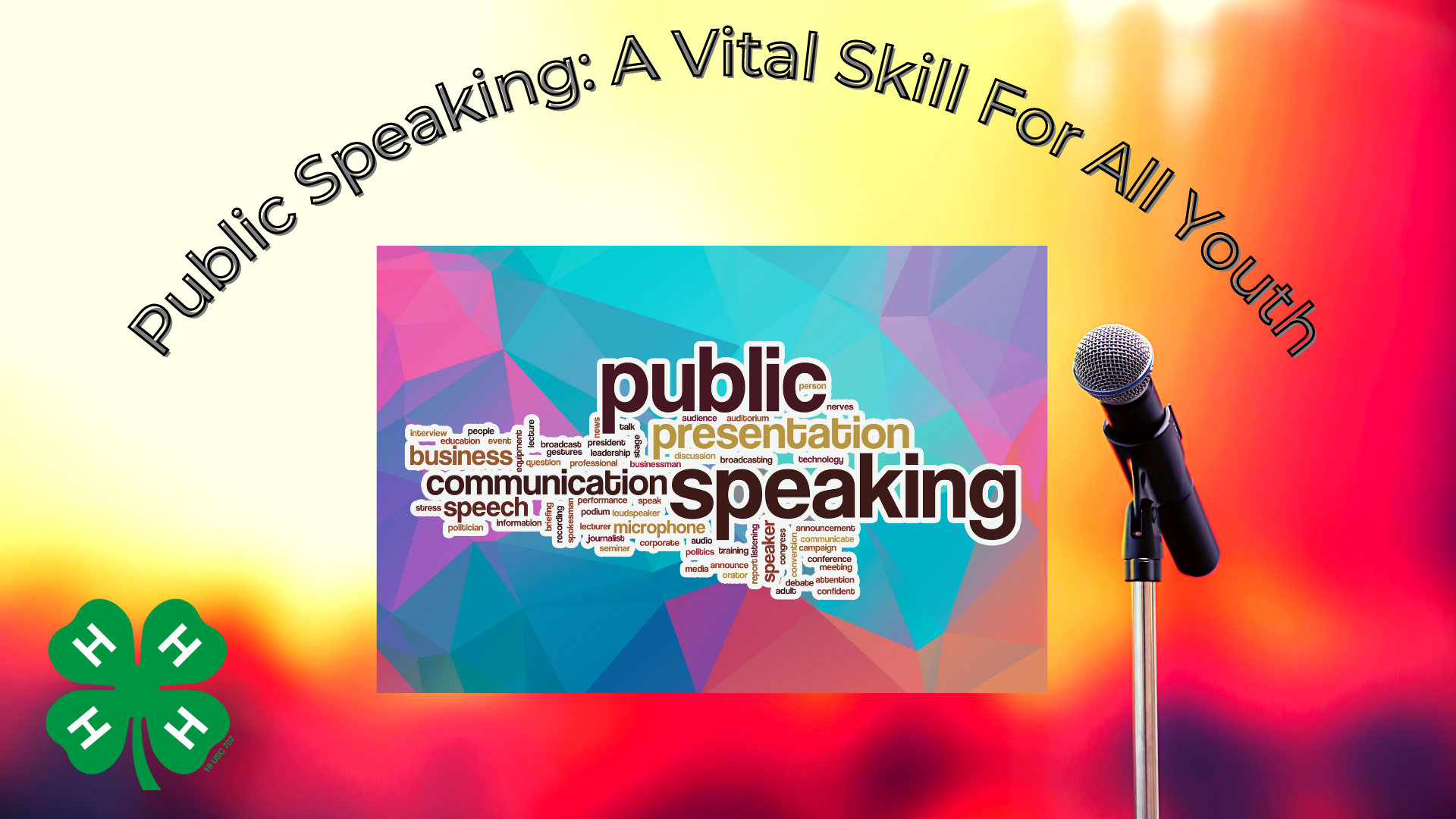Public Speaking: A Vital Skill for All Youth
go.ncsu.edu/readext?846981
en Español / em Português
El inglés es el idioma de control de esta página. En la medida en que haya algún conflicto entre la traducción al inglés y la traducción, el inglés prevalece.
Al hacer clic en el enlace de traducción se activa un servicio de traducción gratuito para convertir la página al español. Al igual que con cualquier traducción por Internet, la conversión no es sensible al contexto y puede que no traduzca el texto en su significado original. NC State Extension no garantiza la exactitud del texto traducido. Por favor, tenga en cuenta que algunas aplicaciones y/o servicios pueden no funcionar como se espera cuando se traducen.
Português
Inglês é o idioma de controle desta página. Na medida que haja algum conflito entre o texto original em Inglês e a tradução, o Inglês prevalece.
Ao clicar no link de tradução, um serviço gratuito de tradução será ativado para converter a página para o Português. Como em qualquer tradução pela internet, a conversão não é sensivel ao contexto e pode não ocorrer a tradução para o significado orginal. O serviço de Extensão da Carolina do Norte (NC State Extension) não garante a exatidão do texto traduzido. Por favor, observe que algumas funções ou serviços podem não funcionar como esperado após a tradução.
English
English is the controlling language of this page. To the extent there is any conflict between the English text and the translation, English controls.
Clicking on the translation link activates a free translation service to convert the page to Spanish. As with any Internet translation, the conversion is not context-sensitive and may not translate the text to its original meaning. NC State Extension does not guarantee the accuracy of the translated text. Please note that some applications and/or services may not function as expected when translated.
Collapse ▲
A 2019 study by the National Institute of Health lists public speaking as the number one fear for adult Americans. In fact, 75% of American adults fear public speaking, which ranks ahead of fear of death, spiders and heights; and this often leads to avoidance of any situation requiring public speaking. However, learning how to become an effective public speaker can be the key difference between success and failure in your life at home, at work and in your community.
A child who can effectively communicate orally with peers or an audience is likely to be viewed in a more positive light by others and develop a stronger sense of self-worth. Children who are able to stand up and speak with confidence, poise and skill, will find that it not only helps them in school, but also empowers them in many situations that they encounter throughout life. Learning effective communication skills helps young people navigate their increasingly complex world and to prepare for the roles they will assume as young adults.
NC 4-H has long recognized the value of providing youth the opportunity to develop and master effective communications skills. The Public Speaking and Presentations Program provides youth with the opportunity to prepare and deliver a 5-12 minute illustrated talk or demonstration speech under the guidance of caring volunteers and Extension professionals. As a result of this program youth not only gain experience speaking in front of others but also learn other skills such as research, goal setting, organization and increased subject matter knowledge.
Additionally, recent studies by North Carolina State University and the Statesman Debate Institute have shown that youth participating in public speaking programs also have:
- Improved academic performance as a result of the application of the critical thinking, research, analytical thought processes and organization skills learned in the public speaking being applied to all their educational endeavors.
- Increased listening skills as they are exposed to a variety of opinions and viewpoints which may differ from their own. This not only entails paying closer attention to details, but also learning how to relate to those with differing opinions and viewpoints, which can make a tremendous difference in relationships with friends and family, as well as coworkers and employers.
- Courage to voice opinions and influence others for good. The confidence to convey your opinion, backed up by solid evidence, can do wonders when seeking to influence others for good and make a positive impact.
- Empowerment to overcome fear. Doing hard things builds confidence, and public speaking is no exception. Public speaking activities give students the coaching and confidence to stand before their peers and deliver persuasive prose with conviction.
- Stronger preparation for the future. Critical thinking and self-confidence are important areas of growth for a successful transition to adulthood. These skills are specifically targeted in public speaking activities, allowing futures to be fortified regardless of the chosen education and career path. This is evident in the fact that the skill set desired by employers remains largely the same from year to year and topping the list of desirable qualities is effective communication skills. In general, job positions will require you to work well with others to accomplish tasks, which demands a listening ear, the ability to understand a variety of perspectives, and an aptitude to express yourself with confidence.
Participation in public speaking programs helps youth not only master communications skills and become more independent, but to also gain self-esteem, and sharpen their critical thinking and organizational skills. The wealth of benefits gained by youth who participate in 4-H public speaking activities are highly desirable as the understanding, communication skills, and confidence gained transfer to all areas of life. Participating youth gain numerous experiences for his/herself and come away with an increased ability and desire to think critically and positively impact the world in whatever situation they may find themselves in.
For questions or more information please contact Sherry Fischlschweiger at sherry_fischlschweiger@ncsu.edu or by calling 252-232-2262.




